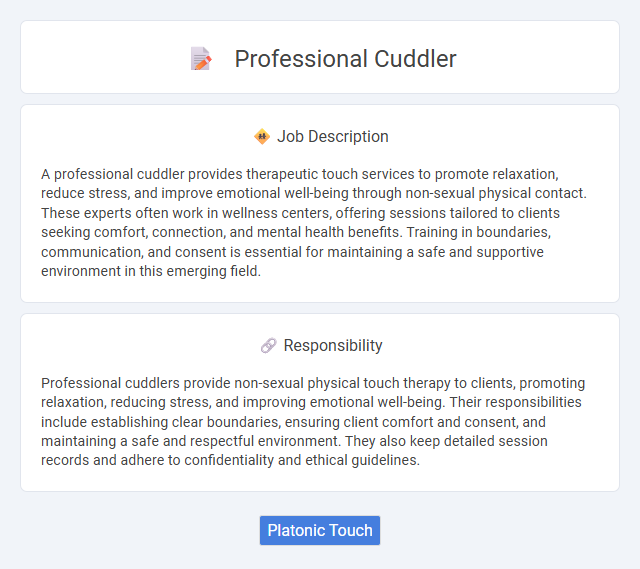
A professional cuddler provides therapeutic touch services to promote relaxation, reduce stress, and improve emotional well-being through non-sexual physical contact. These experts often work in wellness centers, offering sessions tailored to clients seeking comfort, connection, and mental health benefits. Training in boundaries, communication, and consent is essential for maintaining a safe and supportive environment in this emerging field.
Individuals experiencing high levels of loneliness, stress, or emotional anxiety may find professional cuddling a suitable job due to its emphasis on providing comfort and human connection. People who are empathetic, patient, and maintain strong personal boundaries are likely better suited for this role, as it requires emotional sensitivity and professionalism. Those uncomfortable with physical touch or lacking emotional resilience might find the job challenging and less appropriate for their temperament.
Qualification
Professional cuddler jobs require strong interpersonal skills and emotional intelligence to create a safe, comfortable environment for clients. Candidates typically need certification from accredited cuddling organizations that provide training in boundaries, communication, and consent protocols. Experience in counseling, therapy, or customer service enhances a professional cuddler's ability to meet diverse client needs effectively.
Responsibility
Professional cuddlers provide non-sexual physical touch therapy to clients, promoting relaxation, reducing stress, and improving emotional well-being. Their responsibilities include establishing clear boundaries, ensuring client comfort and consent, and maintaining a safe and respectful environment. They also keep detailed session records and adhere to confidentiality and ethical guidelines.
Benefit
Professional cuddling likely offers significant emotional benefits, such as reducing stress and promoting feelings of comfort and safety through non-sexual physical touch. This job may help clients improve their mental well-being and alleviate loneliness by providing a safe, supportive environment. The level of human connection and physical contact could contribute to increased oxytocin release, enhancing overall mood and relaxation.
Challenge
Professional cuddling may present challenges related to establishing clear boundaries and maintaining emotional balance during client sessions. It likely requires strong communication skills to navigate comfort levels and consent, which can vary significantly between individuals. Managing personal emotions while providing empathetic support might be a continual learning process in this role.
Career Advancement
Professional cuddling offers unique career advancement opportunities through specialized certifications and workshops that enhance skills in emotional intelligence and client care. Building a strong client base and gaining positive testimonials can lead to higher demand, increased rates, and potential roles such as cuddle therapist or workshop facilitator. Networking within wellness and therapy communities further expands career prospects and establishes the cuddler as a trusted expert in touch therapy.
Key Terms
Platonic Touch
Professional cuddlers specialize in providing platonic touch therapy, emphasizing non-sexual, comforting physical contact to promote emotional well-being and reduce stress. This role requires strong interpersonal skills and an understanding of boundaries to create a safe, supportive environment for clients seeking connection and relaxation. Sessions often incorporate techniques like gentle hugging, hand-holding, and soothing touch to foster trust and emotional healing.
 kuljobs.com
kuljobs.com